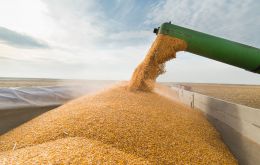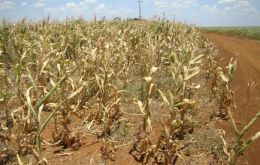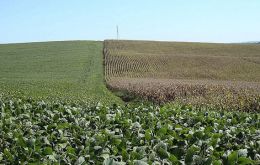MercoPress. South Atlantic News Agency
Tag: crop
-
Saturday, November 3rd 2018 - 07:52 UTC
Brazil expands agriculture area and expects another crop of almost 120 million tons

Brazil’s National Supply Company (Conab) has released its monthly report this week, and it projects that the country will produce 119.4 million metric tons. Last season, the country produced 119.2 million metric tons. The surface would jump from 86.7 million acres to 89.2 million acres.
-
Friday, October 12th 2018 - 08:43 UTC
Despite poor weather Argentina expects a 2018/19 wheat crop of 19 million tons

Frost and a lack of rain could scale back Argentina's wheat crop for the 2018-19 season, which is currently seen at a record 19.7 million tons, the Buenos Aires Grains Exchange said on Thursday.
-
Wednesday, August 29th 2018 - 08:23 UTC
UK heat wave consequences: shop prices increase breaking a 63 month cycle

UK shop prices have risen for the first time in five years, according to the latest data from the British Retail Consortium (BRC). It said shop prices increased by 0.1% in August, breaking a cycle of 63 months when prices fell. This happens after food inflation jumped to a seven-month high of 1.9% after the recent heat wave, which hit crop yields.
-
Saturday, December 23rd 2017 - 09:46 UTC
Chemicals less and less effective against Asian rust in Brazil's soybean fields

Over almost two decades, a plant disease known as Asian rust has infiltrated soybean fields across Brazil -- the world’s biggest exporter of the versatile oilseed used in countless consumer products. But the pathogen has become so resistant to chemicals meant to kill it that many farmers spray several times during their growing seasons, and still endure output losses.
-
Monday, March 5th 2012 - 23:42 UTC
Brazil 2011/12 soy and corn crops estimates slightly lower to 69.5m and 60.4m tons

Brazil’s 2011/12 soybean and corn crops are forecasted to be slightly lower than the original February estimates according to the latest release from industry and market analyst.
-
Wednesday, January 4th 2012 - 06:26 UTC
Dry weather, heat and lack of rain threaten Mercosur soybean crop

Mercosur soybean production is expected to fall 2.9% after dry weather and heat damaged crops in Brazil and Paraguay and as conditions deteriorate in Argentina, Hamburg-based industry researcher Oil World said.
-
Monday, November 21st 2011 - 07:10 UTC
Argentina forecasts 49.5 million tons of soybeans 12 million tons of wheat

Argentina's 2011-12 soybean area will likely rise 0.6% on the year to 19 million hectares, the Agriculture Ministry said in its weekly crop report. The forecast is the first from the ministry for soybeans, the country's top crop and export.
-
Wednesday, November 10th 2010 - 00:52 UTC
Soybeans futures at their highest in two years on USDA report on US crop

Soybeans futures settled at their highest in more than two years on Tuesday after the Agriculture Department, USDA, slashed its forecast for the United States soybean production to 3.375 billion bushels from 3.408 billion bushels the previous month.
-
Tuesday, August 24th 2010 - 05:07 UTC
Russia admits crop loss of 38%; self sufficient in 2010 but no reserves for 2011

Russia has enough grain to cover its domestic needs after harvesting this year 38% less than the previous crop, a senior official said Monday. However markets believe Russia could be forced to import several million tons to ensure grain reserves until the following 2011 harvest
-
Monday, July 19th 2010 - 00:15 UTC
World production of rough rice affected by dry weather in Mekong River

Global production of rough rice, the staple for half the world’s population, may be 6 million tons less than estimated earlier this year after prolonged dry weather in the Mekong River region hurt crops, according to the United Nations Food and Agriculture Organization.
